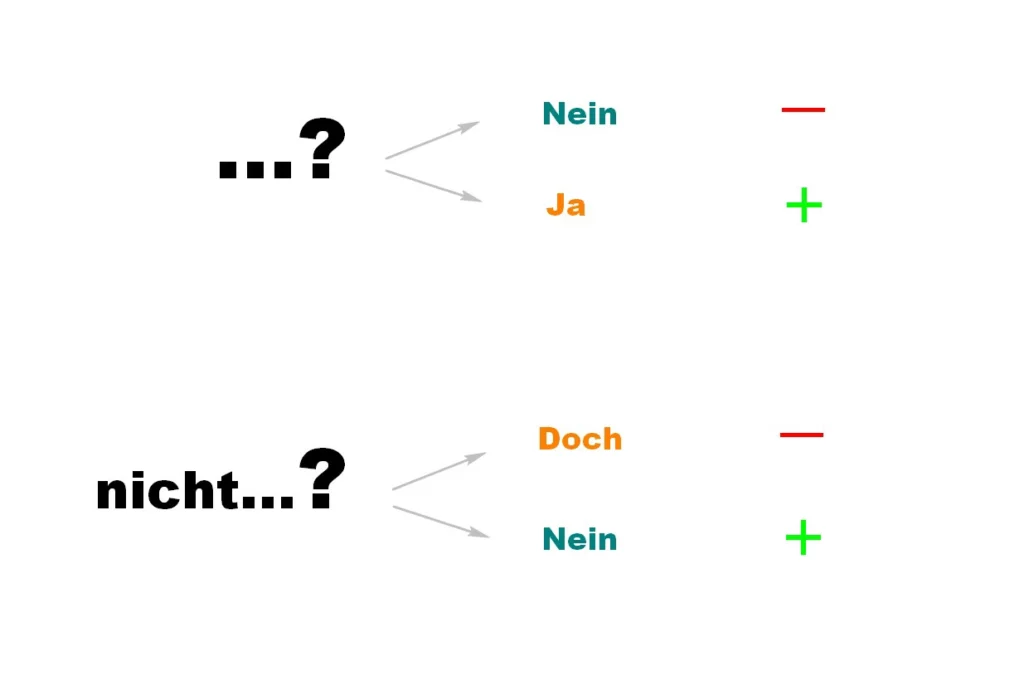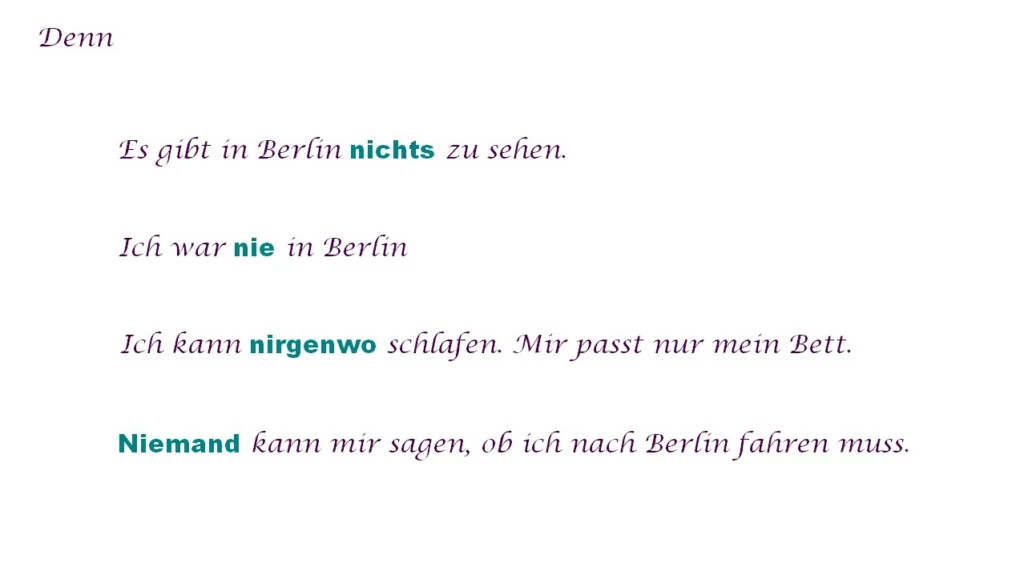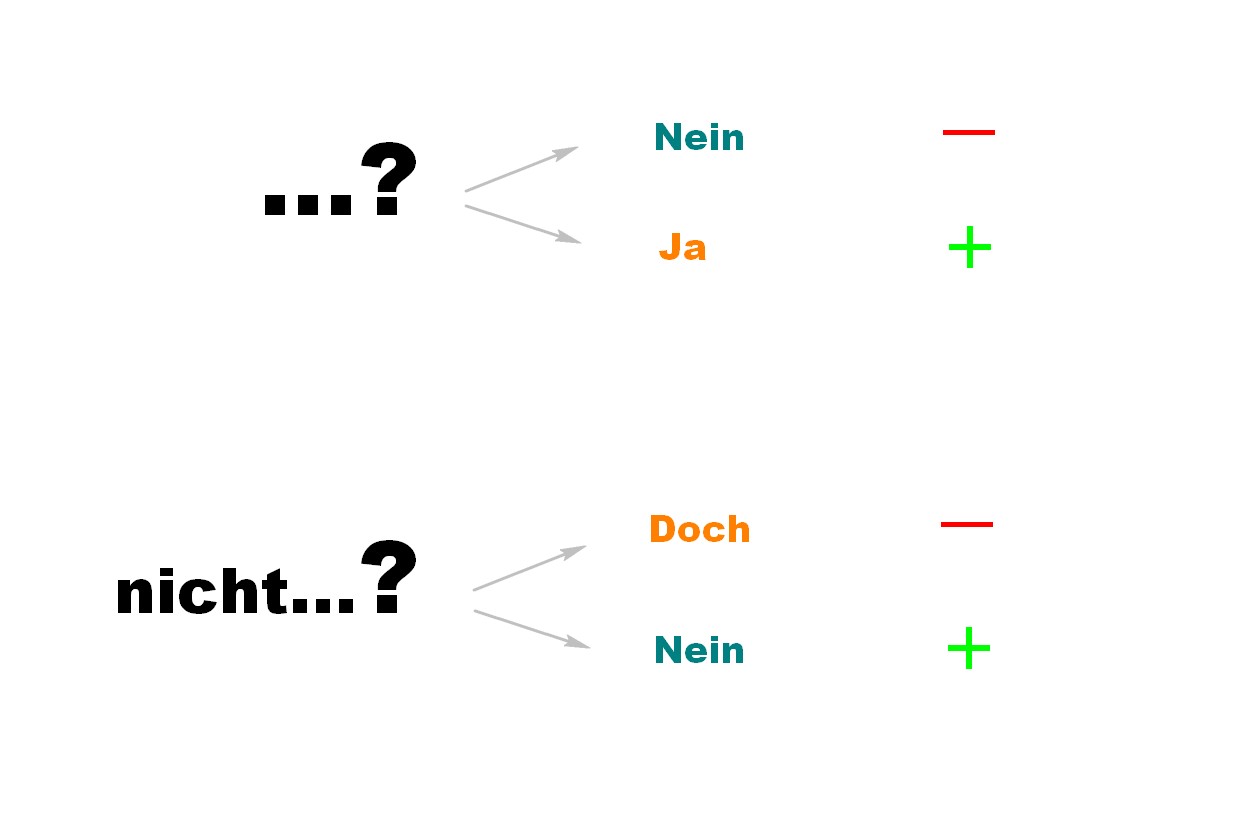Last Updated on June 19, 2024
What is the difference between kein and nicht? Are nicht and nein the same thing? And how else can negation be expressed in German? Let’s talk about negation in German.
Over the years, my answer “nein” has often been followed up with a nicht? , so I already managed to completely get confused when what is used. Let’s start by answer on the questions.
German idioms about lie, nonsense, boasting
Difference between schlimm and schlecht
Aufmachen or öffnen or offen or eröffnen
German idioms about talking
German. False participles
Difference between achten and beachten, aufpassen, Acht geben
From horror to anxiety: fürchten, Angst haben, erschrecken, bangen, entsetzen
Sentences with zu in German
Negation in German as answer to the questions
Negation in German in response to the questions is expressed in two words. The choice depends on whether there is a negation in the question itself.
If the question is normal, without negation, then the negative answer will be Nein.
Kauftst du heute ein? – Nein, ich mache das am Samstag.
If the question is negative, then the word Nein will be a positive answer!
Bist du nicht müde? – Nein. (Ich bin nicht müde)
I agree: yes, I’m not tired
Bist du nicht müde? – Doch. (Ich bin müde)
I object: no, I’m tired

Negation of nouns without prepositions. Difference between kein and nicht
The negation of nouns is also possible with two words. In this case, it depends on whether there is a definite article, and on the meaning.
With a definite article, negation with the word nicht is possible and it will refer to this particular object.
If there is no definite article, then the negation is used with the word kein. It means “none”, “not at all”.
We look at how the word kein changes in the topic of articles.
Basic German with tables. 2. Articles in German
Ich kaufe keine Jacken.
(I don’t buy any jackets, the climate is warm here)
Ich kaufe die Jacke nicht
(I won’t buy this particular jacket.)
Ich habe keinen Hunger
(noun without article)
Das ist kein Wolf
(not a specific wolf and none at all, it’s a cat)
kein Wort mehr!
Ich habe kein Geld

Negation with nicht
Everything else we negate with nicht:
this could be the whole sentence
name
noun with preposition
adverb
Nicht is placed at the end of a sentence if the entire sentence is negated. Naturally, if some part of the verb comes there, then nicht has to give this place to it.
If we negate part of the sentence, then nicht is placed before this part. In this case, there may be two options with different meanings.
Er fährt nach Berlin nicht.
(and in general he has a sick leave, he stays at home)
Er fährt nicht nach Berlin.
(he is not going to Berlin, but to Belgium)
das geht nicht!
du sollst nicht lügen!
das kann ich nicht sagen
ich meine dich nicht
ich meine nicht dich
das Konzert findet heute nicht statt
Ich gehe nicht ins Kino (aber ins Theater)
das Wetter ist nicht schön
es kann nicht lange dauern
er ist nicht unzufrieden
»Kann ich kommen?« »Noch nicht!«
part of the sentence is missing here: Du kannst noch nicht kommen.

Difference between nicht and nichts and other negative adverbs
Nichts means “nothing” and is opposed to “some” or “all”
ich tue ihm nichts
sie weiß nichts
er hat nichts gegessen
es gab nichts Neues
das macht nichts!
Besides nichts are also used:
niemand
nie, niemals
nirgendwohin, nirgendwo

Other types of negation
In addition to those described, there are two more two-component methods of negation:
nicht nur … sondern auch (not only, but) – this is actually an enumeration, not a negation
weder … noch (neither … nor)
Ich spreche weder Deutsch, noch Englisch
Ich spreche nicht nur Deutsch, sonder auch Englisch
Read about ways to link parts of sentences here:
Conjunctions in sentences. Different word order
Conjunctions in sentences. Different word order. 2
At a level closer to B2, one should also not forget about the stylistic variants of negation, which are expressed by negative suffixes and prefixes (the main ones are –los, un-) and prepositions außer, ohne
All posts about #German grammar
All posts about #German idioms and synonyms
German idioms about lie, nonsense, boasting
Difference between schlimm and schlecht
Aufmachen or öffnen or offen or eröffnen
German idioms about talking
German. False participles
Difference between achten and beachten, aufpassen, Acht geben
From horror to anxiety: fürchten, Angst haben, erschrecken, bangen, entsetzen
Sentences with zu in German
Do you enjoy the site without cookies and maybe without ads? This means that I work for you at my own expense.
Perhaps you would like to support my work here.
Or Cookie settings change: round sign bottom left

